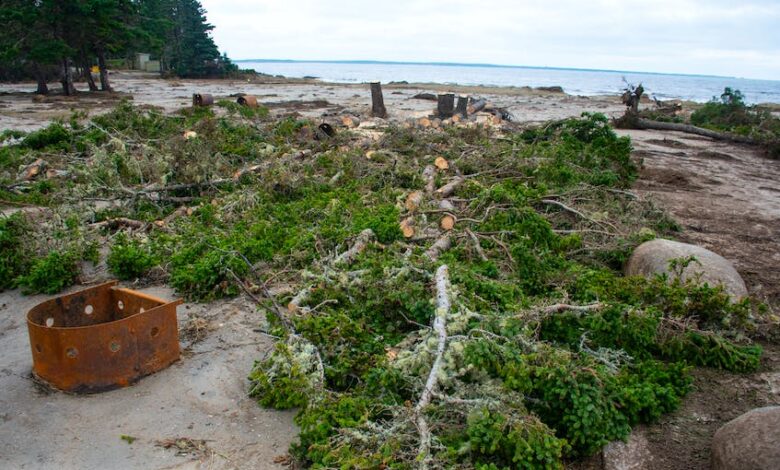Rissers beach, park ‘completely ruined’ by brutal force of post-tropical storm Lee

Rissers Beach sustained immeasurable damage as Lee blasted through the Lunenburg County area Saturday.
“What it means is we’ll never see it again, it’s gone, it’s ruined,” said Elaine Whynot. “The beach is completely ruined, the park is completely ruined. All our beaches took a really bad beating in this storm.”
Rissers Beach, located about 24 kilometres south of Bridgewater, took a direct hit, according to a Facebook post from Linda Mason, a former Chronicle Herald journalist who lives in Italy Cross.
“The boardwalk is gone and washed down the beach, the back walkway/path is completely covered with rocks, debris and fallen trees,” Mason wrote. “It is impossible to walk or pass through.
“Most of the burn pits are washed away, other buildings are gone or removed from their original sites, nothing is the same.”
The area experienced winds of more than 100 km/h.
‘Shocked, saddened’
The bridge over the brook from Little Risser Beach to Big Risser Beach is gone, moved back in the woods, Mason said.
“I was shocked and totally saddened at what I saw,” she said. “It will take years and a great deal of funding to bring the beach and campground back to the way it once was. So many people (are) there and all in a state of disbelief.”
Whynot, who grew up along the ocean near Crescent Beach and now lives in Crousetown, said she walks the beach every day and “this is the worst” she has ever seen.
“An older gentleman told me that this is the worst storm that he has seen since 1952, hurricane Edna,” Whynot said. “He believes it may have come up to hurricane Edna.”
Whynot said the brunt of the storm was anticipated to strike the Yarmouth area but for whatever reason, it clobbered the South Shore.
Whynot said uprooted trees are scattered on the beach.
“It’s sad, it’s awful,” she said. “I was shocked.”
Novel episode
Michael Beck, visiting the area from Yorkshire, England, to celebrate his daughter-in-law’s 50th birthday, said he and his wife arrived on Friday afternoon amid reports from his son and weather forecasters of a pending hurricane strike.
“I was reading the reports and I could see what was going to happen,” Beck said of arriving in Nova Scotia. “I didn’t pass on too much information to my wife and the rest of the family, sort of keeping them in the dark, trying not to worry them Obviously I knew that there was going to be high winds and heavy rainfall, and thought we’ll just have to weather the storm.”
“We don’t get hurricanes in England very often, we’ll get strong winds and heavy weather but nothing of this scale.”

The provincial park, featuring 1.5. kilometres of sheltered sandy beach, two campgrounds and a boardwalk along an island marsh, is located at the mouth of the Petite Riviere in Lunenburg County.
“Due to storm surge, there was significant damage to coastal areas at Rissers Beach including the Little Rissers campsites and day-use beach area,” a spokeswoman for the Natural Resources Department said in a Monday afternoon email.
“The park is currently without power,” Adele Poirier said. “Our number one concern is safety. The park remains closed until further notice while staff assess damage and address hazards.”
Following infrastructure inspections, the department will determine next steps, she said.
“The department is doing similar work in our parks across the province. We are reopening parks as it is safe to do so.”
Park updates
Eight provincial camping parks were to reopen at 2 p.m. Monday, including Battery, Blomidon, Caribou-Munroes Island, Ellenwood Lake, Mira River, Porters Lake, Valleyview, and Whycocomagh parks.
“The remaining camping parks are being assessed for damages and clean up is underway.”
Updates will be available in the parks advisory section on the website https://parks.novascotia.ca/ and the department can be followed on social media for news.
“We ask Nova Scotians for their patience and to respect park closures while we do our work,” Poirier said, adding that all effected campers with reservations will be contacted and they will get full refunds.

The operating season for Rissers Beach park is from May 19 to Oct. 9 and the park beach was supervised during the summer months of July and August.
Meanwhile, Parks Canada has advised visitors and the public that national historic sites, including Halifax Citadel, Fort Anne, Port-Royal, and Grand-Pre are all open as usual.
Weekend visitation at Georges Island will resume next weekend.
The Kejimkujik National Park is closed until further notice.
Storm damage is minimal but the site remains without electricity. Parks Canada crews are assessing damage and clearing trees and debris and Nova Scotia Power crews are onsite working to restore power.
Still powerless
Kejimkujik National Park Seaside sustained more damage and remains closed until further notice while the full extent of damage is assessed.
It is not surprising that Rissers Beach park is located in an area of the province hardest hit by Lee.
Nova Scotia Power said in a release Sunday morning that about 277,000 customers were affected by the significant winds that caused trees to come down on power lines.
The utility said crews, facing very challenging conditions Saturday, were able to restore power to approximately 170,000 customers by Sunday morning.
By 10 a.m. Monday, NSP reported about 21,000 customers were still affected by the outage, a number that fell to 19,000 by noon and to 15,180 customers by 4 p.m.
Nova Scotia Power reported that the western part of the province – the South Shore, Tri-County and Annapolis Valley – and the Halifax metro area, as well as Truro and New Glasgow in the northeast region, were hardest hit by the storm.
There were still 7,258 customers without power in the Bridgewater area and 4,445 in Lunenburg by the 4 p.m. update.
Storm winds reached more than 100 km/h in most of the west and the northeast area of the province and more than 120 km/h in parts of Halifax Regional Municipality.




